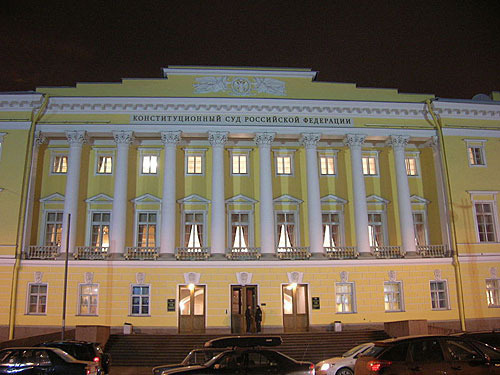
12 March 2010, 20:00
Russian CC not to return juries on terror cases, experts say
Lawyers do not believe, while waiting for the Constitutional Court (CC) of the Russian Federation to consider the conformity to the Constitution of the amendments made by the State Duma in the end of 2008 in the Russian Code of Civil Procedure (CCP) and concerning the trial by jury for those accused of especially grave crimes, that the right to be tried by jurymen will be returned.
The above amendments enable transferring the criminal cases on terrorism, organization of illegal armed formations, mass disorders, mutinies and other crimes against the state for consideration by panels of three professional judges, whereas earlier they could be considered by twelve jurymen.
Those defendants, who have expressed their readiness to cooperate with the inquiry and signed an agreement on such cooperation, have the right to have their cases considered in special order, which means that the judicial session is reduced, run by one judge and, mainly, by written materials of the case.
The CC initiated this consideration after the request from the Sverdlovsk Regional Court and applications of several defendants, accused of grave and especially grave crimes.
The defendants-applicants believe that cancellation of juries encroaches on their rights, since, in their opinion, this form of justice is the most reliable.
In its turn, the Sverdlovsk Regional Court, challenges the provision of the CCP, which provides those accused of grave and especially grave crimes with the option to select the court composition. The Sverdlovsk Court believes that the above norm breaks the principles of equality of everyone before the law and the court and the equality of arms and parties, since does not allow some defendants to enjoy their procedural rights (in this case - to the special order of considering their cases) and puts these rights under dependence from the desire of other defendants.
The Articles, which now exclude the right to a jury, are as follows: 205 (act of terrorism), 206 (taking a hostage), 208 (organization of and participation in an illegal armed formation), 212 (mass disorders), 275 (high treason), 276 (espionage), 278 (violent capture of power or violent retention of power), 279 (armed mutiny) and 281 (subversive act).
Meanwhile, the citizens' right to a jury is fixed in the Constitution of the Russian Federation, which guarantees equality of the rights and freedoms of the person and citizen. That is, deprivation of a part of Russian citizens of the right to a jury breaks the constitutional principle of equality, lawyers believe.
A lawyer and an expert in international law, who preferred to remain anonymous, gave his comment on the point considered by the CC: "Indeed, there's a problem, as the right to an abridged trial is infringed for those, who have pled guilty, if they are tried together with at least one person who had chosen a jury. This is an omission of the law. General information is given, but there're no details for individual cases."
At the same time the lawyer does not think that "the idea to cancel juries in the cases on terrorism assumes what it means." He quoted the statistics that in Russia juries pass acquittals in 20 percent of cases, while the courts of general jurisdiction - in less than 1 percent of cases. "For some reason, in our judiciary an acquittal is thought to be something like a 'defect'. It is regarded as something 'under-investigated'. The statistics shows that the system has accusatory inclination," the lawyer said.
Besides, he pointed to the other side of the problem - safety of jurymen, who can be pressed on by this or that party in trial. According to the expert, a system to protect them is required, "but how it works in Russia is a question."
"So far, the CC has made no decision on juries. We wait for the result with interest. It seems to me that the Court may explain what to do in the cases when those eligible for a jury and those banned are tried on one case. However, I strongly doubt that those accused of terror will be allowed again to choose the trial by jury," said the lawyer.
"Personally I believe that this option should be returned to those accused of grave crimes, because in the course of inquiry of these crime categories Russian law enforcement bodies apply torture and other illegal methods for 'knocking out' evidences. And even if a person is innocent, but got into this 'meat grinder', he will go under the same article and after torturing will give all the evidences the inspector needs," he said.
See earlier reports: "Medvedev signs laws on territorial jurisdiction of terror cases," "Ingushetia: defence in "Case of Twelve" to appeal against cancellation of jury," "Jurymen acquit two suspects of attempt on President of Chechnya."
Author: Lydia Mikhalchenko Source: CK correspondent




